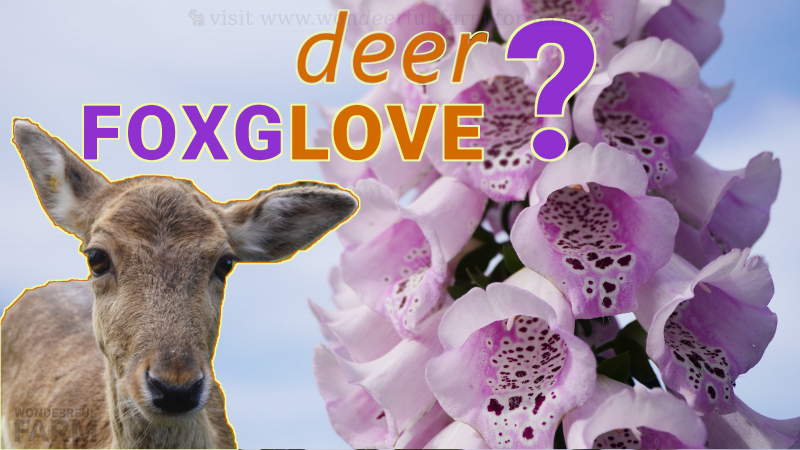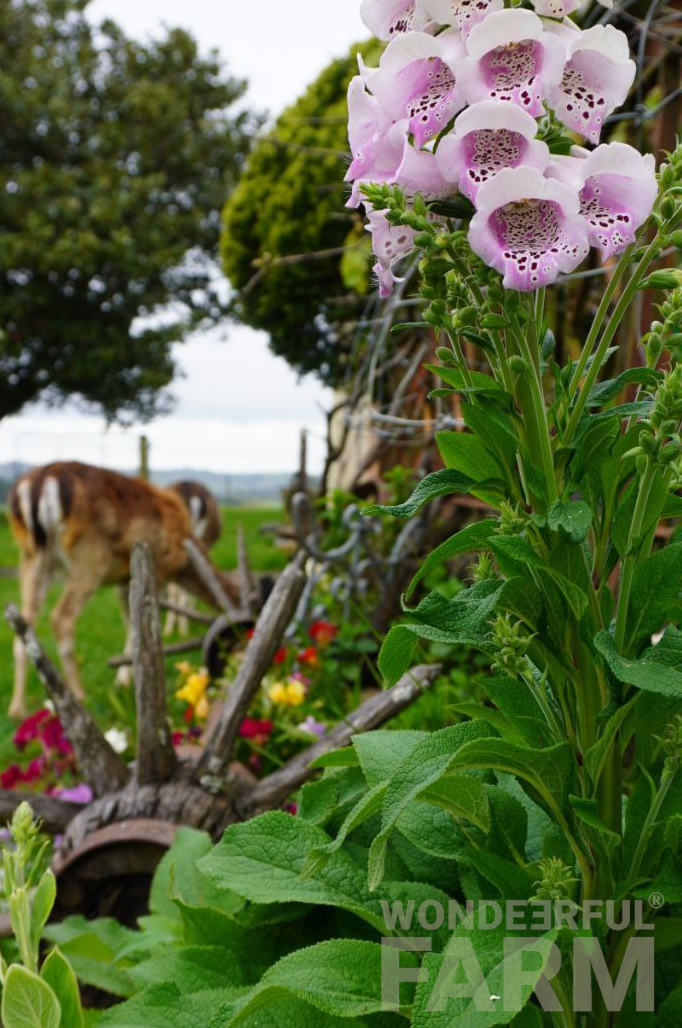Is Foxglove Deer Resistant?
» Deer stories » Deer resistant plants » Is Foxglove Deer Resistant?Plant type: perennials
Deer resistant: yes
Our plant hardiness zone:
New Zealand: subtropical
U.S. Zone 10b
Foxgloves, scientifically known as Digitalis purpurea, are perennial plants native to Europe. They are famous for their striking, bell-shaped flowers that come in various shades of purple, pink, white, and occasionally yellow. Foxgloves are often found in cottage gardens and woodland settings.

If you're wondering whether these lovely blooms are safe from the nibbling mouths of deer, you're in the right place.
But first, let's make a small note that every component of the foxglove plant possesses toxicity for both animals and humans. Inhaling its pollen can even induce adverse reactions in some people (never happened to me, I've smelled its flowers). The leaves, adorned with fine hairs, have the potential to provoke a rash lasting up to two to three weeks, according to some sources. I remember having an itch right after removing some bottom leaves from the plant, which went away after right I washed hands with soap, but you might want to wear garden gloves. < < (If you purchase through that link we may get a reward at no additional cost to you! Thanks!)
So, is digitalis deer-resistant?
Our Experience on WonDeerFul Farm
Deer are notorious for grazing on garden vegetation, and many gardeners have struggled to protect their gardens from these hungry visitors.
At our deer farm, we've had the opportunity to cultivate a few foxglove plants, and the results have been quite promising. Initially, when we introduced young transplants into the garden, the deer did take a small bite out of some of them. But that was it.

After that initial nibble, the deer seemed to lose interest in foxgloves. Unlike some other plants in our garden, foxgloves were left alone once they had been sampled (and some deer never even tried them, just avoided). This suggests that foxgloves can be considered deer-resistant to a great extent.
For comparison, just the other day, again, some deer yanked a French marigold out of the pot on the steps. And a day earlier, a couple offenders were busy chewing away on fresh new jasmine leaves. These are plants deer keep coming back to, for more. So they have to stay out of easy reach to survive.
This foxglove monster of a plant has flourished right under deer noses, untouched.
Slug and Snail Resistant
In addition to their resistance to deer, foxgloves also have another advantage - they are relatively slug and snail resistant. Many gardeners grapple with the constant presence of these slimy pests, particularly in damp and shaded areas. However, in our garden, where we have an abundance of slugs and snails, drawn in by both humid climate and presence of deer feed, foxgloves have fared exceptionally well.
We've noticed that foxgloves grown in full sun positions exhibit minimal damage from slugs and snails. On the other hand, those planted in shadier spots do show some small signs of damage and tend to grow slower. But they still grow!
Conclusion
In conclusion, foxgloves can be considered a valuable addition to your garden if you're concerned about deer and slug/snail damage. While deer may take a nibble out of young transplants, they typically leave foxgloves alone once they've sampled them. Moreover, foxgloves have shown resistance to slugs and snails, particularly when grown in full sun positions.
So, if you're looking to add some elegance and color to your garden without constantly battling deer and slugs, foxgloves could be the perfect choice for you. With their striking blooms and deer and pest-resistant qualities, these plants can bring joy to your garden while minimizing the headaches that often come with gardening in deer-prone areas.
Happy gardening!
Last modified 17 October 2023 at 10:15
Published 16 October 2023
Add your comment
Plants alphabetically
More «Deer resistant plants» stories
Do Deer Eat Squash And Zucchini (Fruits And Foliage)?
Sure, deer will eat some squash and zucchini if they are hungry and food sources are scarce. See for yourself (video).
read more...
Do Deer Eat Irises?
Are bearded iris plants and flowers deer resistant? We are growing some tall iris varieties on our deer farm and this post looks at whether deer eat them.
read more...
Do Deer Eat Peas? (We've tested!)
As beginner gardeners, we've tried to grow our first snap pea plant this year and it was a success! We've grown a huge vine with lots of pods in the end. How did our deer react to this garden pea plant?
read more...
 '
'


